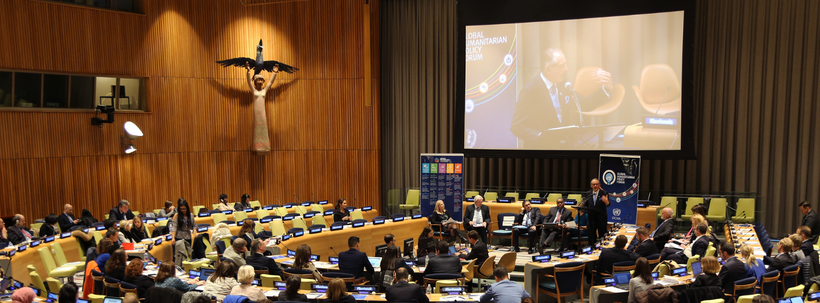Global Humanitarian Policy Forum 2016

- Start date:
- End date:
New York
On December 12-13, OCHA held its annual Global Humanitarian Policy Forum. The event marked the 25th anniversary of GA resolution 46/182 and helped to maintain the focus and resolve on moving forward the commitments made at the World Humanitarian Summit (WHS). The rich technical discussions that ensued, with over 100 experts from Member States, UN Agencies, local and international NGOs, academia and the private sector, maintained the spirit of the multi-stakeholder approach of the WHS. The Forum was also live-streamed online; an archive of discussions is available here.
The 2016 Global Humanitarian Policy Forum opened with two high-level panels discussions:
One Humanity: Shared Responsibility - From (GA) resolution 46/182 to the World Humanitarian Summit
The first panel discussed progress made since the adoption of the resolution in 1991, and the outstanding challenges identified at the World Humanitarian Summit. Speakers included:
- Mr. Jan Eliasson, Deputy Secretary-General, United Nations
- Mr. Garry Conille, Under Secretary General, Programmes and Operations, International Federation of Red Cross and Red Crescent Societies
- Ms. Carolyn Miles, President & CEO of Save the Children International
- Mr. Stephen O’Brien, Under-Secretary-General for Humanitarian Affairs and Emergency Relief Coordinator
- Mr. Hasan Ulusoy, Director General for Multilateral Political Affairs of Turkey
The session was headlined by opening remarks from the President of the UN General Assembly, H.E. Mr Peter Thomson, and a keynote speech from the UN Deputy Secretary-General, H.E. Mr. Jan Eliasson. Both recognized the central role that 46/182 has played in enabling response to international humanitarian crises today, but also how it provides the basis for tackling current challenges by better linking humanitarian and development systems to reduce needs, risks and vulnerability as envisaged in the Agenda for Humanity. It also highlighted how humanitarian action can and must contribute to the achievement of the Sustainable Development Goals.
Overcoming divides – working towards collective outcomes
The second panel discussion looked at follow-up actions from the World Humanitarian Summit, including on how the peace/humanitarian/development nexus contributes towards the Sustainable Development Goals (SDGs). Speakers included:
- Ms. Nazanin Ash, Vice President of Public Policy and Advocacy, International Rescue Committee
- Ms. Paula Gaviria Betancur, Minister and Presidential High Commissioner for Human Rights, Colombia
- Mr. Mahmoud Mohieldin, Senior Vice President for the 2030 Development Agenda, World Bank
- Dr. David Nabarro, UN Special Adviser on 2030 Agenda for Sustainable Development
- Ms. Ulla Tørnæs, Minister of Development Cooperation, Denmark
Panellists endorsed the New Way of Working to transcend humanitarian and development divides to not only meet, but reduce, needs. The discussion emphasised the links between reducing vulnerability and addressing humanitarian needs, and recognized the need for concerted action and adequate financing. Panellists highlighted some of the progress already underway: Denmark announced its “joint development cooperation and humanitarian action strategy” and Colombia reflected on its experience strengthening common results frameworks where humanitarian and development actors work together towards collective outcomes. The World Humanitarian Summit was highlighted as a watershed moment in stimulating change and a commitment to humanity.
The Forum also saw the launch of OCHA’s annual World Humanitarian Data and Trends report, which can be explored through its interactive companion microsite www.unocha.org/datatrends2016.
Workshops and Outcomes
The technical discussions on the second day of the Forum explored six areas of the Agenda for Humanity that have emerged as priorities. These included:
- “Reinforce, Do Not Replace”: Approaches in Coordination and Capacity Development
- Anticipate, Don’t React: Managing Disaster Risks for Resilience After The WHS
- Leaving No One Behind: Reflecting On Effective Strategies To Address Internal Displacement
- Changing People’s Lives: The New Way of Working for Collective Outcomes
- Gender Equality and Women’s Empowerment at The Center of Humanitarian Action
- A Global Campaign for Compliance with International Humanitarian Law
In each of these sessions, participants discussed the progress made in the months since WHS. At the session on localization, multiple actors called for greater investments in local capacity, and for more research on how this can be done in different settings. The session on natural disasters saw strong emphasis on anticipating risk (especially climate change) and ensuring adequate financing mechanisms to prevent and prepare for crises. At the collective outcomes workshop, there was strong consensus on the need to move quicker from the current needs-based approach to an outcomes-based approach when the situation allows. The need for a new way of working was further emphasized at the workshop on addressing internal displacement, where participants called for better collaboration between humanitarian and development actors in protracted internal displacement situations, to reduce the vulnerability of IDPs and host communities over time. The workshop on gender equality and women’s empowerment outlined tools and processes that can support advancing the agenda collectively while enabling accountability. The session on international humanitarian law (IHL) highlighted the value of international humanitarian law and the benefits of compliance, including the need for better data collection tools and appropriate forums to discuss compliance, exert influence and share good practices.
The Forum wrapped up on 13th December with a briefing the Chief of the Policy Development and Studies Branch, Hansjoerg Strohmeyer, who reflected on the overall landscape post-World Humanitarian Summit, highlighting the Agenda for Humanity and its shifts as critical for continuity and progress. Forum participants shared the recommendations stemming from each workshop, as well as barriers, opportunities, and good practices with respect to practical implementation of change.
